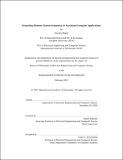| dc.contributor.advisor | Daniel Sanchez. | en_US |
| dc.contributor.author | Zhang, Guowei,Ph. D.Massachusetts Institute of Technology. | en_US |
| dc.contributor.other | Massachusetts Institute of Technology. Department of Electrical Engineering and Computer Science. | en_US |
| dc.date.accessioned | 2021-05-24T20:23:31Z | |
| dc.date.available | 2021-05-24T20:23:31Z | |
| dc.date.copyright | 2021 | en_US |
| dc.date.issued | 2021 | en_US |
| dc.identifier.uri | https://hdl.handle.net/1721.1/130774 | |
| dc.description | Thesis: Ph. D., Massachusetts Institute of Technology, Department of Electrical Engineering and Computer Science, February, 2021 | en_US |
| dc.description | Cataloged from the official PDF of thesis. | en_US |
| dc.description | Includes bibliographical references (pages 109-128). | en_US |
| dc.description.abstract | Computer systems are increasingly bottlenecked by data movement, and rely on sophisticated memory hierarchies to address this issue. However, conventional memory systems suffer from poor performance on many irregular access patterns. This is because memory systems use an inexpressive interface that does not convey sufficient program semantics: they organize data in fixed-sized chunks and access data with only reads and writes. As a result, memory systems incur significant performance loss on several common patterns. In this thesis, we identify three such patterns: accesses to small data fragments suffer poor locality; concurrent updates introduce excessive traffic and serialization; and dependent reads incur long latencies that are on the critical path. To tackle these issues, this thesis proposes techniques that extend the semantics of the memory system. We apply this insight to address each of the three issues and propose solutions with different degrees of generality. | en_US |
| dc.description.abstract | COUP and COMMTM provide general architectural support by exploiting commutative updates to reduce communication and synchronization. COUP supports strict single-instruction commutativity by extending the cache coherence protocol, while COMMTM supports multi-instruction and semantic commutativity by leveraging hardware transactional memory. Whereas COUP and COMMTM are general, HTA and GAMMA target a specific data structure and a specific application, respectively. HTA addresses the inefficiencies of small fragments in the context of hash tables. It exploits the associativity in hash tables and leverages caches to reduce runtime overheads and to improve spatial locality. GAMMA is a sparse matrix-matrix multiplication accelerator. Its novel storage idiom, FIBERCACHE, combines caching and decoupled execution to ensure low latency for dependent reads with irregular reuse. This enables GAMMA to adopt an efficient dataflow, Gustavson's algorithm, to minimize off-chip traffic. | en_US |
| dc.description.abstract | In return, these techniques improve the performance and reduce the data movement of challenging applications significantly. | en_US |
| dc.description.statementofresponsibility | by Guowei Zhang. | en_US |
| dc.format.extent | 128 pages | en_US |
| dc.language.iso | eng | en_US |
| dc.publisher | Massachusetts Institute of Technology | en_US |
| dc.rights | MIT theses may be protected by copyright. Please reuse MIT thesis content according to the MIT Libraries Permissions Policy, which is available through the URL provided. | en_US |
| dc.rights.uri | http://dspace.mit.edu/handle/1721.1/7582 | en_US |
| dc.subject | Electrical Engineering and Computer Science. | en_US |
| dc.title | Extending memory system semantics to accelerate irregular applications | en_US |
| dc.type | Thesis | en_US |
| dc.description.degree | Ph. D. | en_US |
| dc.contributor.department | Massachusetts Institute of Technology. Department of Electrical Engineering and Computer Science | en_US |
| dc.identifier.oclc | 1252062370 | en_US |
| dc.description.collection | Ph.D. Massachusetts Institute of Technology, Department of Electrical Engineering and Computer Science | en_US |
| dspace.imported | 2021-05-24T20:23:31Z | en_US |
| mit.thesis.degree | Doctoral | en_US |
| mit.thesis.department | EECS | en_US |
